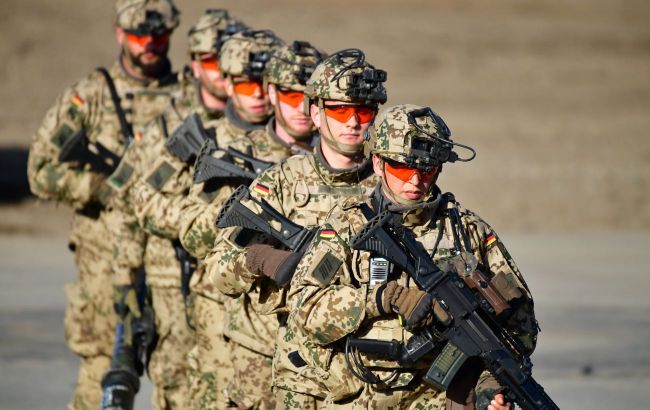Germany drafts secret contingency plan for potential war with Russia — WSJ
 Photo: Germany develops secret plan in case of war with Russia (Getty Images)
Photo: Germany develops secret plan in case of war with Russia (Getty Images)
Germany is developing and implementing a secret plan in case of war with Russia, which involves sending up to 800,000 NATO troops to the front line, according to The Wall Street Journal.
About 2.5 years ago, 12 high-ranking German officers gathered at a military complex in Berlin to work on a secret plan in case of war with Russia. Now they are rushing to implement it.
This is Operation Plan Germany, a secret document 1,200 pages long.
The plan describes in detail how about 800,000 German, American, and other NATO troops will be transported east to the front line. It also identifies the ports, rivers, railways, and roads they will use to advance, as well as how they will be supplied and protected along the way.
The plan is the clearest manifestation to date of what its authors call an all-of-society approach to war.
The WSJ emphasizes that German officials have stated that they expect Russia to be ready and willing to attack NATO in 2029. But a series of espionage incidents, sabotage attacks, and incursions into European airspace, many of which Western intelligence attributes to Moscow, suggest that it may be preparing for an earlier attack.
Analysts also believe that a possible ceasefire in Ukraine, which the US is pushing for this week, could free up time and resources for Russia to prepare for action against NATO members in Europe.
A senior military officer and one of the original authors of the plan, known in military circles as OPLAN DEU, says the goal is to prevent war by making it clear to their enemies that if they attack Germany, they will not succeed.
OPLAN is currently hosted on an isolated red network of the military and is in its second draft.
According to the agency, the team of Lieutenant General André Bodemann, a veteran of Kosovo and Afghanistan, completed the first version of the plan by March last year, drawing on feedback from a growing circle of ministries, government agencies, and local authorities.
The focus is on infrastructure. In the long term, Berlin intends to spend €166 billion on infrastructure by 2029, including more than €100 billion on long-neglected railways, and to give priority to dual-use infrastructure.
The WSJ notes that in a war with Russia, Germany would no longer be a frontline state but a staging area. In addition to degraded infrastructure, it would have to contend with reduced military forces and new threats such as drones.
Shortcomings in peacetime legislation have also made it difficult for Germany to defend itself against sabotage, one of the biggest threats facing OPLAN.
At the same time, the Bundeswehr is optimistic about its progress.
An officer and co-author of OPLAN says that, considering that they started from scratch in early 2023, they are very pleased with where they are today. He adds it's a very complex product.
As recent stress tests have shown, there is still work to be done to bring the plan and reality into line. The biggest uncertainty facing the authors of the plan is how much time they have.
Europe preparing for war with Russia
Earlier, Martin Jäger, president of Germany's Federal Foreign Intelligence Service (BND), said that Russia's Vladimir Putin is ready to test European borders and could provoke a hot confrontation at any moment.
The EU claims that Russia may test NATO's defenses over the next two to four years. Moscow may try to attack one of the Baltic states.
Ukrainian military intelligence has reported that Russia considers a large-scale war in Europe to be inevitable in the medium term.
The EU is preparing to launch a large-scale defense reform, including joint production of drones. Brussels wants to make Europe ready for war by 2030.

